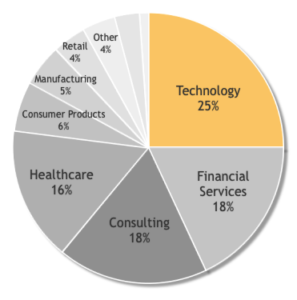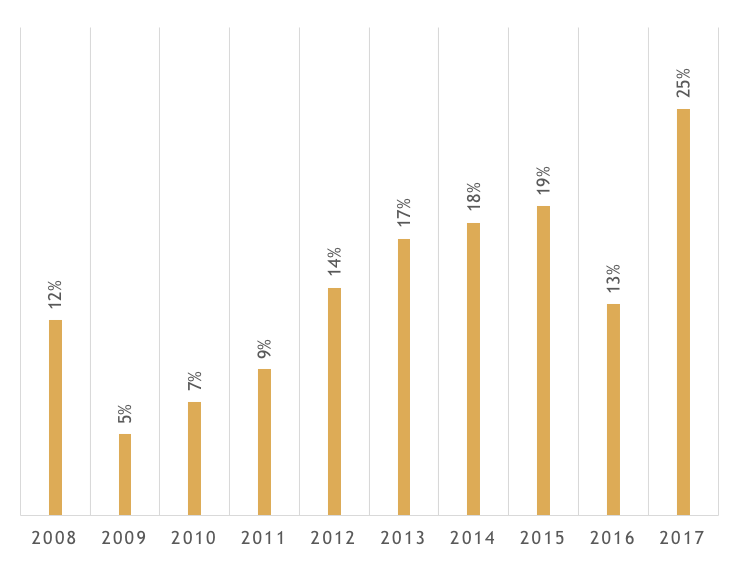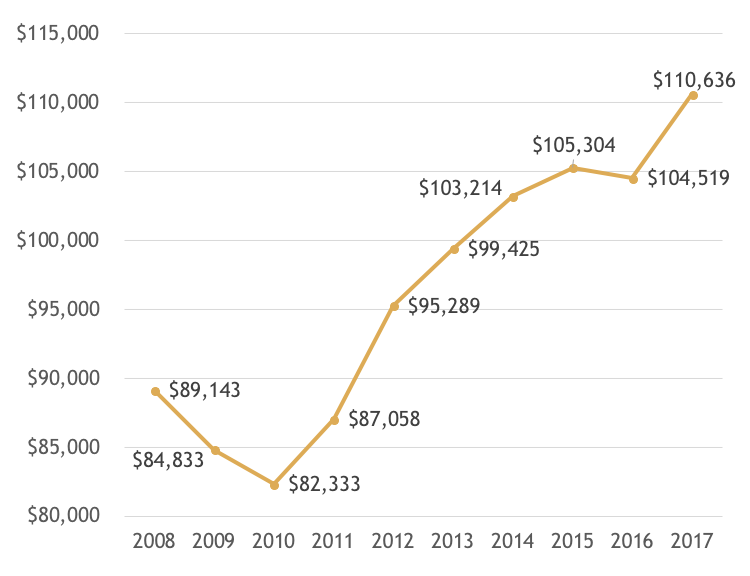By Kara Sherrer

Class of 2017 full-time offers by industry Source: Vanderbilt MBA Employment Report 2017
Over the past decade, the technology industry has exploded in growth and opportunities — and MBAs have joined the crowd of hopefuls vying for jobs in Silicon Valley and other tech hotspots. Tech may bring to mind legions of engineers or nocturnal coders in hoodies, but as the industry has matured, tech firms have begun recruiting more and more MBAs, and not just from the West Coast. In 2017, a full quarter of MBA graduates from Vanderbilt Business accepted jobs in the technology industry. Over the past five years, Amazon has been one of the top hiring companies at Vanderbilt.
We sat down with the Career Management Center and a few alumni to learn about MBA job opportunities in tech — and to find out how so many alumni from a business school in Nashville are getting tech jobs at big-name companies on the West Coast and elsewhere.
What Tech Jobs Do MBAs Get?

Emily Anderson, Director of the Career Management Center
Just like any other company, tech companies recruit for many core business functions: HR, finance, operations, supply chain management, and procurement. Some of them also offer leadership development programs (LDP), with general tracks and specializations in certain functions such as HR and finance.
Tech companies also recruit MBAs for product manager positions. While each company defines the role slightly differently, a product manager usually sits between the coders and the customers, helping with product designs, customer tests, and new feature rollouts. Some MBAs are lucky enough to nab a competitive product manager internship, while others intern in another function and then recruit for full-time positions. Some even transition into product management after spending a few years in a different full-time role.
“It helps to have a technical background, but not all people have a complete technical background,” explains Emily Anderson, Director of the Career Management Center.
How MBAs Recruit for Tech Jobs
Some tech companies do recruit on campus, including Amazon, Microsoft, Cisco, and HP Inc. Recruiting for all but the largest tech companies tends to happen later in the cycle; the fast pace of the industry can limit a company’s ability to forecast resource needs to a few months or even weeks before a posting.

Students pose with the Android lawn statues at the Googleplex during the 2018 Tech Trek
To maximize their chances of getting a job in tech, Vanderbilt students network with alumni, attend the Tech Trek, participate in the Day by the Bay recruiting event, and join the Tech Club. The Tech Trek is particularly helpful in introducing students to both the breadth of job opportunities and a large number of alumni: Closing Bell receptions in San Francisco and Seattle each boasted more than 100 attendees this year.
MBA graduates find that their coursework prepares them well for their new jobs, particularly if they recruit for “traditional” business positions at tech firms. “I think that the fundamental skills and capabilities that I have acquired through getting my MBA…is at the heart of what’s needed. But where tech comes into play is the subject matter expertise,” said Kelly Leo (BS’03, MBA’11), Director of Strategic Marketing at Change Healthcare, a healthcare technology company.
“Like any industry, (tech) has its own lingo, and if you don’t speak the language, it’s really obvious,” confirms Amanda Fend, Senior Associate Director at the Career Management Center. “If you don’t speak the lingo, you’re an outsider, and you can’t be an outsider.”
“There’s a lot of jargon and acronyms being thrown around,” Leo adds. “Being able to take what seemingly can be very complex and distilling it down to simple information is valuable (in the tech space).”

Vanderbilt MBAs accepting tech jobs as a % of the graduating class
Source: Vanderbilt MBA Employment Reports, 2008-2017
Expanding the Definition of Tech Jobs
While large businesses like Amazon, Google, and Facebook come to mind as the ultimate example of “true” tech companies, tech is increasingly becoming an important part of every business, even those that aren’t traditionally considered “tech” companies. Indeed, some MBAs end up in tech-related positions without even trying.
“I did not come into Owen thinking tech, or anything related to tech,” admits Will Hamblen (MBA’15), Senior Manager of Online Grocery at Walmart Global eCommerce. He accepted a position in Walmart’s finance and strategy rotation program after school, and his first position took him to the company’s headquarters in Bentonville, Arkansas, supporting the entertainment and hardlines business. His second rotation brought him out to the West Coast, working for the online grocery division, and he ended up staying.
“I was really sold on Walmart, and given that e-commerce is playing such a big role in retail right now, it made sense for me to get some sort of e-commerce experience…I’ve been out here ever since,” Hamblen said.
“One can arrive in tech through multiple areas…I don’t necessarily think of tech as one unified industry. Really, it’s an area that touches multiple industries,” Leo said, reflecting on her work in healthcare technology, which isn’t often thought of as capital-T “tech” work — even as healthcare technology transforms both the industry and patient care.
“There are a lot of companies that you wouldn’t necessarily think of as ‘tech’ that are actually using technology to better their business,” Hamblen added. “Walmart might not be known as a tech company, so to speak, but there are technology roles, and there are obviously (for example) finance roles supporting a more tech-driven business.”

Vanderbilt MBA graduate average starting salaries for tech jobs over the past decade
Source: Vanderbilt MBA Employment Reports, 2008-2017
Why Do MBAs Want to Work in Tech?

Amanda Fend, Senior Associate Director of the CMC
Tech companies’ flat structure and fast pace of work are no secret, and they’re certainly a major draw for MBA graduates looking for work. “(Tech) organizations tend to be flatter than in other industries…it’s mostly around managing projects versus large staffs of people, because it’s so much of a matrix out there,” Anderson explained. For employees open to a career path with lateral moves and unexpected opportunities, as opposed to climbing a structured corporate hierarchy, tech can be an excellent fit.
The technology itself also open up work opportunities that wouldn’t be available otherwise. “We can come up with different propositions and test and try them in different ways than we probably could have (without the) technology,” Hamblen said. “Given how dynamic and how fast-paced the world of online grocery is, (the) scope is going to be a lot bigger.”
“The whole value proposition (of technology) is doing something better, faster, cheaper, so from a marketing perspective, or just from a functional perspective, you’re also tasked with doing your work better, faster, cheaper as well,” Leo added.
“(Tech companies are) such complex, virtual, diverse organizations, where things are happening so quickly,” Fend said. “I think the value of an MBA is being able to synthesize a lot of information quickly and…to identify how decisions will impact a lot of different things at once.”